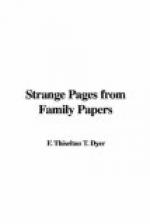According to Lysons, in the course of his wanderings he attached himself to itinerant quacks, learned their remedies, practised their calling, his knowledge, coupled with his great experience, gaining for him the reputation of being “a most infallible doctress.” He also went in for astrology, and made a considerable sum of money, but was so extravagant that when he died his worldly goods were not valued at half-a-sovereign. About a year before his death he returned to his native parish, his great age bringing him into much notoriety; but his death was very sudden, and great was the surprise on all sides when it became known that he was a man. In life this strange character was a general favourite, and Mr. Thrale was wont to have him in his kitchen at Streatham Park, while Dr. Johnson, who considered him a shrewd person, held long conversations with him. To prevent the discovery of his sex he used to wear a cloth tied under his chin, and a large pair of nippers, found in his pocket after death, are supposed to have been the instruments with which he was in the habit of removing the tell-tale hairs from his face.[46]
In some instances, as in times of political intrigue and commotion, disguise has been resorted to as a means of escape and concealment of personal identity, one of the most romantic and remarkable cases on record being that of Lord Clifford, popularly known as the “shepherd lad.” It appears that Lady Clifford, apprehensive lest the life of her son, seven years of age, might be sacrificed in vengeance for the blood of the youthful Earl of Rutland, whom Lord Clifford had murdered in cold blood at the termination of the battle of Sandal, placed him in the keeping of a shepherd who had married one of her inferior servants—an attendant on the boy’s nurse. His name and parentage laid aside, the young boy was brought up among the moors and hills as one of the shepherd’s own children. On reaching the age of fourteen, a rumour somehow spread to the Court that the son of “the black-faced Clifford,” as his father had been called, was living in concealment in Yorkshire. His mother, naturally alarmed, had the boy immediately removed to the vicinity of the village of Threlkeld, amidst the Cumberland hills, where she had sometimes the opportunity of seeing him.
But, strange to say it is doubtful whether Lady Clifford made known her relationship to him, or whether, indeed, the “shepherd lord” had any distinct idea of his lofty lineage. It is generally supposed, however, that there was a complete separation between mother and child—a tradition which was accepted by Wordsworth, with whom the story of the shepherd boy was an especial favourite. In his “Song at the Feast of Brougham Castle,” the poet thus prettily describes the shepherd boy’s curious career:—




